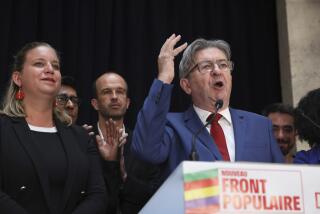French Ecologist Party Benefits From ‘Ozone Effect’
- Share via
PARIS — Benefiting from what one analyst described as the “ozone effect” of mounting international concern over the Earth’s atmosphere, the historically weak French environment movement found itself in an unaccustomed position of influence going into the second round of nationwide municipal elections this week.
Loosely allied with the more militant Greens in neighboring West Germany, the Ecologist Party scored surprisingly well in many of the 36,000 French towns and cities that held local elections this past weekend. In several important cities, including Paris and Strasbourg, ecologist candidates qualified for a second round of voting Sunday by winning more than 10% of the vote.
Under the complicated voting formula employed in the municipal elections, this ensures the environmentalists substantial influence, particularly in cities where candidates from the traditional right- and left-wing parties fail to win an absolute majority in the second round of voting.
“This marks the emergence of a Green political force in France on a level that has existed before in the other European countries,” Ecologist Party leader Antoine Waechter said Monday. The party averaged more than 8% of the vote in cities where it fielded candidates, with particularly strong showings in Alsace, Brittany and Normandy.
In general, however, the massive French political exercise had few of the national implications contained in the last such vote in 1983, when French voters demonstrated their unhappiness with economic policies of the early allied Socialist-Communist government of President Francois Mitterrand and then-Premier Pierre Mauroy.
Slight Gains for Socialists
The ruling Socialist Party, in fact, registered slight gains at the polls, winning back seven cities it lost in the devastating 1983 vote. Only 13 of the 390 cities with more than 20,000 in population changed political affiliation in the first round of voting.
“No protest or disagreement was recorded,” said Socialist Premier Michel Rocard, clearly pleased.
“It was neither an endorsement of the government nor a condemnation of it,” commented an American diplomatic observer.
Jacques Chirac, leader of the conservative Rally for the Republic party, who was Mitterrand’s main opponent in presidential elections last spring, easily kept control of his power base as mayor of Paris. Conservative candidates backing Chirac won more than half of the vote in 13 of the 20 arrondissements-- municipal subdivisions -- of Paris, eliminating the need for runoffs in those districts.
Chirac received more than twice as many votes--369,231--as his Socialist Party rival for mayor, Interior Minister Pierre Joxe--155,880.
Local issues appeared to dominate the races in most parts of France. In Marseilles, voters overwhelmingly returned incumbent Mayor Robert Vigouroux despite his expulsion from the Socialist Party and Mitterrand’s personal backing for his opponent, Michel Pezet.
In Lyon, Rally for the Republic upstart Michel Noir overwhelmed incumbent Mayor Francisque Collomb although the latter had been endorsed by perennial presidential candidate Raymond Barre, a powerful political figure there.
The only national trend in the election was the unexpected showing of the environmentalists. France, which operates 48 nuclear power plants and has its own nuclear military force, has never had a particularly strong environmental movement.
“France has always been a little behind,” Ecologist Party campaign director Jean-Louis Vidal said on Monday.
Three years ago, however, party leaders discarded their generally leftist images and adopted a strategy to appeal to environmentally conscious voters from both the right and left factions of the political base. The “neither right nor left” strategy appeared to pay off this weekend, placing the French Greens in the position of inserting environmental issues into the political arena.
“We are now at the heart of the debate,” said Vidal.
More to Read
Sign up for Essential California
The most important California stories and recommendations in your inbox every morning.
You may occasionally receive promotional content from the Los Angeles Times.













